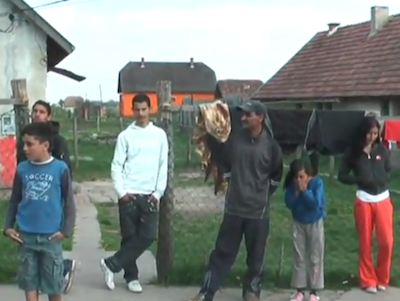Northern Hungary has recently become the center of rising conflicts between the Roma and the Hungarian communities. In the community of Gyöngyöspata, for example, paramilitary organizations marched a month ago [1], claiming they were members of a neighborhood watch, even though their far-right stance was obvious.
A village without a mayor
On April 19, 2011, this video [2] [hu] was posted by a Roma news site So Si? [3] [hu], covering the rumors spreading in the Roma community of Gyöngyöspata about a paramilitary organization's plans to hold a training camp in the village. On the same day came the news of the resignation of the local mayor.
Piroslap blog, referring to a news agency, wrote [4] [hu] that the mayor had explained his decision to resign by health reasons. About the training camp, Piroslap wrote this:
[…] Now the group Véderő wants to hold a military camp at the settlement. On their website they define themselves as [a group] operating far from politics but on the national side, and after the elimination of conscription they would like to offer martial type of training to those who like this kind of education but wouldn't want to be professional soldiers. […]
The Roma have left
By Friday, April 22, some 300 Roma had left Gyöngyöspata, allegedly because they were afraid of the vigilante group arriving at the village for training. According to news reports [5], the departure of the Roma women and children was organized by the Hungarian Red Cross and Richard Field, an American businessman who had already expressed his concerns about the situation of the Roma in Hungary and even started a non-governmental organisation [6] to support them.
The Hungarian media used the word ‘evacuation’ for what happened, whereas government officials claimed this wasn't an evacuation: according to them, the Roma had been taken on an Easter holiday trip for the weekend.
Both Péter Szijjártó [7], the spokesman for the Prime Minister, and Minister of the Interior Sándor Pintér [8] have offered an explanation for what happened. This video [9] [hu] shows Pintér at a press conference held in Gyöngyöspata on Friday. He said:
They [the members of the paramilitary group] took away the happiness which was offered by the charitable organization Red Cross. The national board of the Red Cross invited the women and children from the Gyöngyöspata families for an Easter excursion.
Gellért Rajcsányi of Mandiner wrote [10] [hu]:
[…] Because of the threats, the Roma are afraid of atrocities. A leader for the action said the [Roma] men all stayed in the village trying to protect their valuables left at home. They are expecting members of the Parliament, representatives of embassies and international human right activists to arrive by Friday afternoon. According to János Farkas, the deputy of the Roma Hungarian Civil Rights Movement, the Red Cross contributed in moving out the people who were accommodated in different camps. A representative of the Red Cross told dpa [a German press agency] that this was the first time since World War II when the organization evacuated citizens threatened by a paramilitary group in Hungary. […]
Also on Friday, the Minister of the Interior announced [11] that the government had designed a “decree to penalise civil guard activities conducted without prior approval by the police or feigning a right to act as a keeper of public order.”
By Friday afternoon, the police dismissed the paramilitary training of Véderő. According to news reports, the leader of the group Tamás Eszes was detained. Far-right news site Kuruc.info re-published [12] [hu] these reports, adding an important piece of information: Tamás Eszes is a man who was disqualified from the Hungarian Guard. (Other sources wrote that Mr. Eszes would run for the mayor position now that Gyöngyöspata has no mayor.)
Gellért Rajcsányi wrote that the biggest responsibility is that of the government:
[…] We've been keeping the state for millennia to maintain the outside and inside security. The improvident promise [13] [hu] of making order in two weeks in those points of the country that looked hopeless was unavailing. We know it's impossible to meet close-to-perfect public security even in two-years time but at least there would be signs if we were heading that way! But today, on Good Friday, we have reached another touch bottom. Hungarian citizens fearing for their property and going about in bodily fear are longing for the presence of paramilitary organizations; [meanwhile] other citizens fearing for their property and going about in bodily fear are expecting the solution from leaders of civil rights movements and the Red Cross. The devil is raised in Gyöngyspata. In the international news [broadcasts] there will, hopefully, be good footage with crying children and vigilantes wearing uniforms among the news about Libya and Cote d'Ivoire. […]
Political action?
Photographer Levente Hernádi expressed his doubts [14] [hu] over whether there was no interest in motivating the events. He pointed out that the result of the events have been articles like this one on a Hungarian news site [15] [hu], illustrated with photos about the Roma leaving the village, members of Véderő, the Roma who stayed in the village and a Roma child. The article is a full report about the Roma who left Gyöngyöspata for the weekend and who applied for refugee status in the United States and Canada because of their threatened situation:
[… ] I think Gyöngyöspata was an extremely well-prepared play taking advantage of the always crying and ambiguously speaking Roma and of the national front that always acts nationalistic. It just had to be started and the rest went by itself.
Maximum respect to the one who [does stories] like this one [15] […].
By Sunday, the Roma women and children were back in the village.
